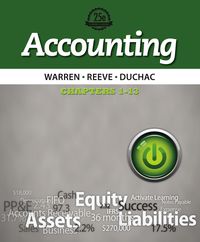Question
In 2021, Julia started a new business, Jolly Doors, and hired her friend Mike. Julia builds beautiful wooden doors while Mike transports them to customers
In 2021, Julia started a new business, Jolly Doors, and hired her friend Mike. Julia builds beautiful wooden doors while Mike transports them to customers and helps them with installation. Most customers agree to get their doors delivered and installed (a $350 cost), but others decide to simply pick them up (a $200 cost). There were 224 doors picked up in 2021.
Mike is paid $200 per day worked. Julia's records show that Mike worked 175 days in 2021 and installed 410 doors. Julia estimates that wood for each door costs her $60, along with a $15 delivery fee. Other expenses are $1,500 per month for rent and utilities, and $10 per door for painting supplies and other minor materials.
To begin her business, Julia purchased $93,000 of used equipment and a $20,000 truck. She was told that the equipment would likely last 9 years, at which point it could be scrapped for $3,000 (a scrapyard would pay her for the metal). Julia plans to own the truck for 80,000 kilometers of use (about 6 years of consistent usage), then sell for $4,000. Julia is wondering how this equipment and truck should be reported on a balance sheet.
In 2022, Julia expects sales to increase 10%. She is pushing Mike to work for her full-time (250 days a year), but he is reluctant to quit his job. He is requesting a salary of $30,000 with commission of $50 per door installed. Julia wonders if it is better to hire a second employee on a part-time basis (same pay structure as Mike's in 2021).
Step by Step Solution
There are 3 Steps involved in it
Step: 1

Get Instant Access to Expert-Tailored Solutions
See step-by-step solutions with expert insights and AI powered tools for academic success
Step: 2

Step: 3

Ace Your Homework with AI
Get the answers you need in no time with our AI-driven, step-by-step assistance
Get Started


